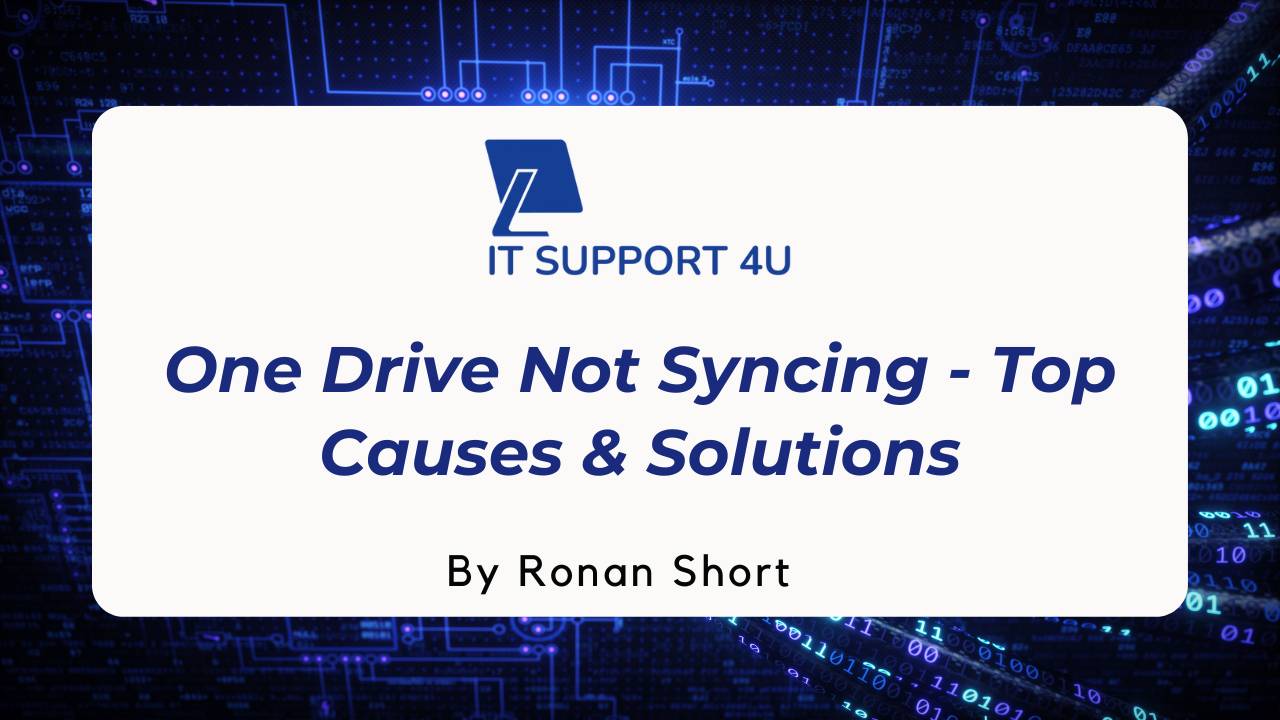Are you wondering what exactly IT support does in your organisation and why it's crucial? Research shows that most small business owners are never fully aware of their IT department's responsibilities! So, this blog post will offer a simple but detailed exploration of the duties and importance of IT support. So, let's explore!
Key Takeaways
- IT support responsibilities include providing technical assistance and support to users, installing and configuring hardware and software, troubleshooting technical issues, setting up computer networks, and maintaining and repairing equipment.
- IT support professionals need strong knowledge of computer systems and software, excellent problem-solving skills, effective communication skills, the ability to work well under pressure, and attention to detail.
- The importance of IT support in organisations lies in ensuring the smooth operation of computer systems, protecting data and information from unauthorised access or loss, enhancing productivity and efficiency, and providing customer satisfaction.
Duties and Responsibilities of IT Support
The duties and responsibilities of IT support include providing technical assistance and support to users, installing and configuring hardware and software, troubleshooting technical issues, setting up computer networks, and maintaining and repairing equipment.
Providing technical assistance and support to users
Addressing technical issues swiftly and efficiently is a key aspect of our role as IT support specialists. When an employee encounters challenges with their computer system, it's our responsibility to step in.
We diagnose hardware or software faults promptly and deliver solutions that restore normal operations. Our aid doesn't stop there; we also help users understand the cause of the problem to prevent a repeat occurrence.
Offering this technical assistance allows us to keep systems running optimally, reduce downtime, and ensure smooth business operations. Whether it involves troubleshooting errors or guiding an employee through installing new software, we're always ready to lend our expertise when needed.
Installing and configuring hardware and software
To ensure the smooth operation of computer systems, our IT support team is responsible for installing and configuring hardware and software. This involves:
- Setting up new computers, laptops, servers, and other hardware devices.
- Installing operating systems, drivers, and necessary software applications.
- Configuring network settings to enable connectivity.
- Activating security measures to safeguard against threats.
Troubleshooting technical issues
As IT support officers, we are responsible for troubleshooting technical issues and providing solutions to ensure the smooth operation of your computer systems. We have the expertise to diagnose and solve hardware and software faults promptly. Whether it's resolving technical glitches, fixing application issues, or improving IT systems, our team is here to provide you with the necessary assistance. With our help, you can rely on efficient troubleshooting and timely resolutions whenever you encounter any technical difficulties.
Setting up computer networks
We understand the importance of setting up computer networks for your business. It allows for seamless communication and data sharing within your organisation. Here are the steps involved in setting up computer networks:
- Designing and planning the network layout according to your business requirements.
- Installing network routers, switches, and other necessary equipment.
- Configuring network settings such as IP addresses and DNS servers.
- Establishing secure connections between devices to protect sensitive information.
- Testing and troubleshooting the network to ensure proper functionality.
Maintaining and repairing equipment
As IT support specialists, we are responsible for maintaining and repairing equipment. This includes:
- Regularly inspecting and cleaning hardware to ensure optimal performance
- Diagnosing hardware issues and replacing or repairing faulty components as needed
- Conducting preventative maintenance to extend the lifespan of equipment
- Updating firmware and software on devices to enhance functionality and security
- Collaborating with vendors for repairs under warranty or service contracts
Skills and Qualifications Required for IT Support
To succeed in IT support, individuals need a strong knowledge of computer systems and software, excellent problem-solving skills, effective communication skills, the ability to work well under pressure, and attention to detail.
Strong knowledge of computer systems and software
We have a strong knowledge of computer systems and software, which enables us to effectively support your IT needs. Our expertise allows us to install and configure hardware and software, troubleshoot technical issues, and provide assistance with computer networks.
We are well-versed in maintaining and repairing equipment, ensuring that your systems run smoothly. With our extensive knowledge, we can tackle any IT challenge you may face with confidence.
Excellent problem-solving skills
We possess excellent problem-solving skills as IT support professionals. This means that we are adept at analysing complex issues and finding effective solutions. Whether it's troubleshooting technical problems, diagnosing software or hardware faults, or improving IT systems, our problem-solving abilities enable us to address challenges efficiently.
We use our knowledge of computer systems and software to identify the root cause of issues and develop strategies to resolve them quickly. With our expertise, we can ensure that your business experiences minimal disruptions and maximises productivity.
Effective communication skills
We understand that effective communication skills are crucial for IT support professionals. It is important to be able to clearly convey technical information to users in a way that they can easily understand.
This involves active listening, asking the right questions, and providing clear instructions. Good communication helps build trust and rapport with users, which ultimately leads to better problem-solving and customer satisfaction.
Additionally, being able to effectively communicate with colleagues and other members of the IT team is essential for collaboration and teamwork.
Ability to work well under pressure
We understand that working in the IT support field can be challenging, especially when it comes to dealing with urgent technical issues. That's why having the ability to work well under pressure is crucial for IT support professionals like us.
When faced with a high-pressure situation, we remain calm and focused, ensuring that we can efficiently diagnose and resolve any computer systems or software problems. We know how important it is for businesses to have their technology up and running smoothly, especially during critical times.
That's why our expertise in handling stressful situations allows us to provide quick and effective solutions while maintaining strong attention to detail. With our ability to work well under pressure, we ensure that your IT systems stay reliable and uninterrupted, keeping your business operations running smoothly.
Remember, being able to handle pressure requires not only technical expertise but also effective communication skills. By effectively communicating with users during demanding situations, we can gather critical information about the issue at hand and offer clear instructions for troubleshooting or resolving the problem promptly.
Our commitment to excellence means that no matter how intense the situation may be, we are always prepared to step up and deliver exceptional IT support services.
Attention to detail
We are meticulous in our work, paying close attention to every detail. This ensures that we don't overlook any potential issues or errors that may arise in your IT systems. We carefully analyse and diagnose problems, leaving no stone unturned in our search for solutions.
Our commitment to detail means that we take the time to thoroughly test and verify any changes or updates made to your computer systems, ensuring their smooth operation. With our attention to detail, you can trust us to provide you with accurate and reliable IT support.
Importance of IT Support in Organisations
IT support plays a crucial role in organisations by ensuring the smooth operation of computer systems, protecting data and information, enhancing productivity and efficiency, and providing customer satisfaction.
Ensuring smooth operation of computer systems
We are responsible for ensuring the smooth operation of computer systems in your organisation. Our IT support team is dedicated to maintaining and managing the computer systems that keep your business running efficiently.
We install and configure hardware and software, diagnose and solve technical issues, and provide ongoing maintenance and support. By proactively monitoring your IT infrastructure, we minimise disruptions and downtime, allowing you to focus on your core business activities without interruption.
With our expertise in troubleshooting and resolving technical problems, we ensure that your computer systems are always up and running smoothly. Trust us to keep your IT systems functioning at their best so that you can maximise productivity and achieve your business goals effortlessly.
Protecting data and information
Our IT support team plays a crucial role in protecting the data and information of your organisation. We understand the importance of safeguarding sensitive data from unauthorised access, loss, or theft.
With our expertise, we implement robust security measures to prevent any potential breaches or cyberthreats. Our team ensures that all computer systems are equipped with secure firewalls and updated antivirus software.
We also conduct regular backups and system checks to ensure the integrity and availability of your data. Rest assured that your valuable information is in safe hands with our dedicated IT support professionals.
In addition to securing your data, we provide ongoing training and support to enhance cybersecurity awareness among your employees. We educate them on best practises for password management, safe browsing habits, and identifying phishing attempts.
By empowering your staff with the knowledge they need to protect themselves online, we create a strong line of defence against cyberattacks.
Our commitment to protecting your data goes beyond just implementing security measures; it's about building trust through transparency. We keep you informed about any potential vulnerabilities or emerging threats so that you can make informed decisions regarding your organization's digital security.
Enhancing productivity and efficiency
To enhance productivity and efficiency, IT support plays a crucial role in organisations. By ensuring the smooth operation of computer systems, they minimise downtime and keep business processes running smoothly.
They also help protect data and information by implementing security measures and handling backups. Additionally, IT support improves productivity by providing immediate technical assistance to employees when they encounter problems or have questions.
With their expertise in troubleshooting hardware and software issues, IT support officers swiftly resolve technical glitches that could otherwise hinder workflow. Ultimately, their dedication to enhancing productivity ensures that employees can work efficiently without disruptions or delays.
Providing customer satisfaction
Our IT support team is committed to providing customer satisfaction. We understand that when issues arise, it can be frustrating and disruptive to your business operations. That's why we strive to quickly and efficiently resolve technical problems, ensuring minimal downtime for you and your employees.
Our knowledgeable experts are here to assist you with any computer-related issues, from hardware troubleshooting to software installations. We aim to deliver prompt and effective solutions that meet your needs, allowing you to focus on running your business smoothly.
Your satisfaction is our top priority, and we're dedicated to providing the highest level of customer service in all aspects of IT support.
Challenges and Future of IT Support
Keeping up with rapidly advancing technology, cybersecurity risks, increasing demand for remote support, and the integration of automation and AI are some of the key challenges that IT support professionals face.
Learn more about these challenges and how they shape the future of IT support.
Keeping up with rapidly advancing technology
We understand that keeping up with rapidly advancing technology can be a challenge for businesses. As IT support specialists, it is our responsibility to stay updated on the latest advancements in computer systems, software, and networks.
This allows us to provide you with the most effective solutions and support for your IT needs. Whether it's implementing new security measures or integrating cutting-edge software into your operations, we are here to ensure that your business stays ahead of the curve.
With our expertise and commitment to continuous learning, you can trust us to keep your technology up-to-date and running smoothly.
Cybersecurity risks
We must be aware of the cybersecurity risks that businesses face today. Hackers are constantly finding new ways to breach our systems and steal sensitive data. It is crucial for IT support to implement strong security measures to protect against these threats.
This includes keeping software up-to-date, using complex passwords, and regularly backing up data. Additionally, educating employees about phishing scams and other common attack methods can help prevent successful cyberattacks.
By understanding the risks and taking the necessary precautions, we can safeguard our business from potential harm.
Increasing demand for remote support
With the rise of remote work, there has been an increasing demand for remote IT support. This means that IT specialists are now able to assist businesses and employees with technical issues from a distance.
Whether it's troubleshooting software problems or providing guidance on network maintenance, remote support allows for quick and efficient solutions without the need for onsite visits.
This flexibility not only saves time but also reduces costs associated with travel and equipment. As technology continues to advance, businesses can expect this trend of remote IT support to grow even further in the future.
Automation and AI in IT support
Automation and AI are revolutionising the field of IT support. With the advancement of technology, businesses can now automate many routine tasks that were previously performed by IT specialists.
This includes tasks such as diagnosing software or hardware faults, troubleshooting technical issues, and even providing basic technical assistance to users. AI-powered chatbots are also being utilised to handle common inquiries and provide instant solutions to user problems.
These advancements not only improve efficiency but also free up IT support personnel to focus on more complex issues that require human intervention. It's an exciting time for IT support as automation and AI continue to enhance the way businesses handle their IT systems.
Conclusion
In conclusion, IT support plays a crucial role in organisations by providing technical assistance and support to users. Their responsibilities include installing and configuring hardware and software, troubleshooting technical issues, setting up computer networks, maintaining and repairing equipment, and ensuring the smooth operation of computer systems.
Moreover, with their strong knowledge of computer systems and software, excellent problem-solving skills, effective communication abilities, attention to detail, and ability to work well under pressure, IT support professionals are essential for enhancing productivity, protecting data and information, and providing customer satisfaction.
Get an IT Plan Today!













